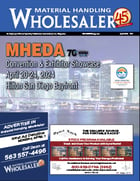 Dave Baiocchi
Dave Baiocchi Operator Training – In or Out?
4229 Volpaia Place
Manteca, CA 95337
Phone: 209 652-7511
Fax: 209 923-8843
http://www.resonantdealer.com
Since March 15th, 1999 OSHA has done their best to complicate life for the forklift consumer. Not that their best efforts haven’t been needed! Gone are the good old days when anyone who worked for the company (and even those that didn’t) could jump on the forklift and unload freight, rearrange the inventory or give a co-worker a ride through the warehouse. The only requirements were two hands, one foot, and a “sense of adventure”.
Nobody would argue that there have been too many accidents, too many tragedies, and too many losses not to put some kind of limits in place. The regulations found in CFR 1910.178 outline hard and fast requirements for all companies that intend to have forklifts operating within their facilities. The regulations “changed the game” for many forklift users. Gone were the days of simply holding a safety meeting and having the company’s insurance agent give everyone a primer of the dangers of industrial equipment. Training now needs to be specific. That specificity has targets. Individual operators have to be trained, tested, evaluated and certified on every type of forklift equipment they would have the opportunity to operate. The testing and evaluation has to be done at the actual facility where the machinery will be used. Documentation that operator training was both “site specific” and “machine specific” are the two things that OSHA inspectors look for on nearly every visit they make. Add to all of this, the fact that even previously trained operators have to be re-trained every 3 years.
Overnight, a new industry was born! Powered Industrial Truck Operator Training (PITOT)! Training was not only a good idea, it was compulsory. Customers, rankled by the change to the status quo, immediately reached out to their forklift suppliers to help them comply with a complicated and costly federal statute. OEM’s started to supply their own version of training materials. I called it “the paper blizzard of 1999”!
Here we are nearly 20 years later. PITOT is still the law of the land, and most all customers (yes, there still are some renegades out there) are doing their due diligence to continue to be compliant with the law. Is it working? It’s improved, but not nearly enough. Much of the improvement can actually be credited to OEM’s engineering some changes in their forklift seats. All responsible OEM’s now equip new forklifts with multiple restraint devices (seat belts, and hip or shoulder restraints). This has prevented numerous fatalities. The number one cause of death in “tip-over” forklift accidents is the overhead guard “mousetrapping” the operator against the floor. Even with the improved devices, forklift operation still accounts for about 85 annual deaths and nearly 97,000 annual injuries, a third of which are serious.
Today many if not most dealers in the US offer their own version of PITOT training. At minimum, dealers are prepared to respond to customers that need this service. My concern about this issue has always been about three things.
- Liability connected with OSHA compliance and accidents
- Competence and retention of the trainers
- Coverage of the required material
Liability
While watching the kids in my neighborhood dare each other to perform skateboard stunts in the street, I often recall the repeated warning parroted by generations of parents: “It’s all fun and games…until someone ends up in the hospital”. I think that the same warning may apply here.
Including PITOT training in your customer offerings is not necessarily a bad thing. The customer needs it. We have the materials. We are IN this business. We can make money at it. In fact, some customers may make it a requirement in order to do business with them. Why wouldn’t we do this?
I’m not saying dealers shouldn’t. I am saying that if they do, they need to have a clear understanding of the implied liability involved. You know how it works…. some driver slams on the brakes with an elevated load, and the resulting injury is serious. The first thing the driver says…. the trainer didn’t mention “THAT”.
BOOM, the customer now expects that you will participate (at least in part) in paying his OSHA fine and limiting his losses. Are you legally liable? Probably not. I’m not a lawyer, but I would expect that training negligence or incompetence would have to be proven to award damages Your dealership’s image however is sure going to take a hit. Bad news travels at light speed and this….is bad news. It may serve you well to make sure that your insurance coverage has adequate E&O protections in case an event like may put you at risk.
Competence
How competent is your trainer? Is training ALL they do? Do they have ANY certifications from outside agencies? What are their motivations to train? Is it an “assigned” task, or are they really in the training business to make a living? Do they make a good living? Are you constantly rehiring and retraining the trainers?
The biggest thing I don’t like about CFR1910.178 is that it does not specify what is and what is not adequate and appropriate training “for the trainer”. How many dealerships have “train the trainer” courses? What credentials do the “trainers of the trainers” have to have in order to be “trainers”?
OSHA has two criteria for trainers.
- Knowledge
- Experience
Wow, those are not exactly measurable metrics! This just adds a level of “whatever you think is best” mentality that starts me worrying about my first concern all over again (liability).
Proper coverage of the material
My worry here is allayed by the fact that many dealers actually use the OEM supplied materials when they perform training services. The OEM’s have taken the time to vet the regulation and ensure that all of the proper materials are provided. As a dealer principal, it always gave me a measure of comfort to have the OEM as a partner in this process.
My remaining question: Is the designated trainer actually using ALL of the material provided? Do they have the proper equipment? Are they performing training at the customers location, and with the customers own lift trucks? Are we including Class 2 and 3 units? Battery Handling? Inspections? Site maps?
It’s human nature for people to cut corners and save time when they are doing things that they feel must be done just to meet an arbitrary standard. Check the boxes and get back to work? This is the danger zone.
By now, you may have concluded that I am not a proponent of dealer-based PITOT training. Allow me to clarify my position and recommendation.
- I am fully in agreement that PITOT training should be part and parcel of a forklift dealers customer service offering.
- This service should be paid for by the customer. (The retail price of the training can also be folded into the sale price of the equipment).
- A full-time trainer, preferably with ASME or other training certifications should perform the training. They should be equipped with the proper AV equipment, and supported with demo or rental equipment when needed. Training should be their ONLY job. They should be well paid and allowed to participate in some sort of commission or bonus program. They should account for each training session with a review of all training activities undertaken and completed. This document should be signed by the customer.
- Short of providing this level of support to a training department, dealers should seek to form a strategic partnership with a certified training company and outsource this function (and its associated liability). Dealers should demand that the supplier use only OEM supplied materials, and have a firm understanding and agreement of what will be included in every training seminar.
I know that if taken seriously, this advice will shake up some status quo. Yes, I’m talking to the dealers who are assigning training duties to their CSR’s. You need your CSR to be on the street selling PM’s, bringing in maintenance contracts, selling major service, and cultivating customers. They can’t do that if are burdened with the “duty” of supplying PITOT training. And truth be told, I would be concerned that the training isn’t as comprehensive as it needs to be.









